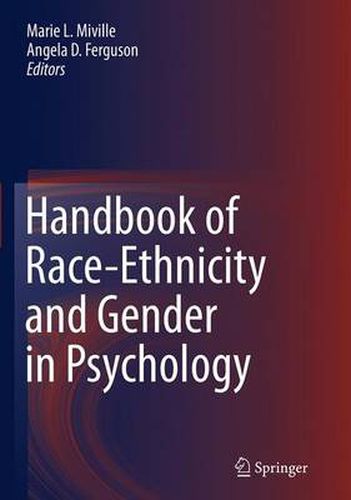Readings Newsletter
Become a Readings Member to make your shopping experience even easier.
Sign in or sign up for free!
You’re not far away from qualifying for FREE standard shipping within Australia
You’ve qualified for FREE standard shipping within Australia
The cart is loading…






This title is printed to order. This book may have been self-published. If so, we cannot guarantee the quality of the content. In the main most books will have gone through the editing process however some may not. We therefore suggest that you be aware of this before ordering this book. If in doubt check either the author or publisher’s details as we are unable to accept any returns unless they are faulty. Please contact us if you have any questions.
Multicultural aspects of psychology have received some attention in the literature in the last decade. A number of texts currently address these significant concerns, for example, Counseling the Culturally Different (Sue & Sue, 2008); Handbook of Multicultural Counseling ( Poterotto et l., 2009); and Handbook of Multicultural Counseling Competencies (Pope-Davis & Coleman, 2005). In their most recent editions, several of these books address more nuanced complexities of diversity, for example, the intersections of gender or social class with race-ethnicity. Meanwhile, other texts have addressed gender issues in psychology (Handbook of Counseling Women, Counseling Men), with some attention paid to racial-ethnic and other diversity concerns. Clearly the progression of scholarship in this field reflects the importance of incorporating multiple aspects of diversity within psychology. However, no book currently exists that fully addresses the complexities of race-ethnicity and gender together. Better understanding of the dual impact of race-ethnicity and gender on psychological functioning may lead to more effective conceptualizations of a number of mental health issues, such as domestic violence, addictions, health-related behaviors and achievement. Exploring the impact of race-ethnicity and gender also may provide a broader understanding of self-in-community, as this affects individuals, families and other social groups and work and career development. Topics of interest may include identity development, worldviews and belief systems, parenting styles, interventions for promoting resilience and persistence and strategies for enhancing more accurate diagnostic and treatment modalities. Today’s world is comprised of multiple and intersecting communities that remain in need of psychological models and interventions that support and promote both individual and collective mental health. We believe that utilizing unidimensional conceptual models (e.g. focusing solely on race-ethnicity or gender) no longer adequately addresses psychological concerns that are dynamic, complex and multi-faceted. The proposed Handbook will focus on timely topics which historically have been under-addressed for a number of diverse populations.
$9.00 standard shipping within Australia
FREE standard shipping within Australia for orders over $100.00
Express & International shipping calculated at checkout
This title is printed to order. This book may have been self-published. If so, we cannot guarantee the quality of the content. In the main most books will have gone through the editing process however some may not. We therefore suggest that you be aware of this before ordering this book. If in doubt check either the author or publisher’s details as we are unable to accept any returns unless they are faulty. Please contact us if you have any questions.
Multicultural aspects of psychology have received some attention in the literature in the last decade. A number of texts currently address these significant concerns, for example, Counseling the Culturally Different (Sue & Sue, 2008); Handbook of Multicultural Counseling ( Poterotto et l., 2009); and Handbook of Multicultural Counseling Competencies (Pope-Davis & Coleman, 2005). In their most recent editions, several of these books address more nuanced complexities of diversity, for example, the intersections of gender or social class with race-ethnicity. Meanwhile, other texts have addressed gender issues in psychology (Handbook of Counseling Women, Counseling Men), with some attention paid to racial-ethnic and other diversity concerns. Clearly the progression of scholarship in this field reflects the importance of incorporating multiple aspects of diversity within psychology. However, no book currently exists that fully addresses the complexities of race-ethnicity and gender together. Better understanding of the dual impact of race-ethnicity and gender on psychological functioning may lead to more effective conceptualizations of a number of mental health issues, such as domestic violence, addictions, health-related behaviors and achievement. Exploring the impact of race-ethnicity and gender also may provide a broader understanding of self-in-community, as this affects individuals, families and other social groups and work and career development. Topics of interest may include identity development, worldviews and belief systems, parenting styles, interventions for promoting resilience and persistence and strategies for enhancing more accurate diagnostic and treatment modalities. Today’s world is comprised of multiple and intersecting communities that remain in need of psychological models and interventions that support and promote both individual and collective mental health. We believe that utilizing unidimensional conceptual models (e.g. focusing solely on race-ethnicity or gender) no longer adequately addresses psychological concerns that are dynamic, complex and multi-faceted. The proposed Handbook will focus on timely topics which historically have been under-addressed for a number of diverse populations.